Sunshine
 for violent content and language.
for violent content and language.
Reviewed by: Ben Tabberer
CONTRIBUTOR
| Moral Rating: | Very Offensive |
| Moviemaking Quality: |
|
| Primary Audience: | Adults |
| Genre: | Sci-Fi Thriller |
| Length: | 1 hr. 47 min. |
| Year of Release: | 2007 |
| USA Release: |
July 20, 2007 (wide) |
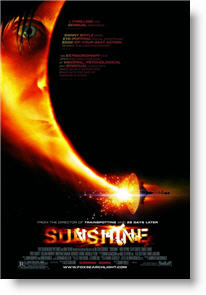


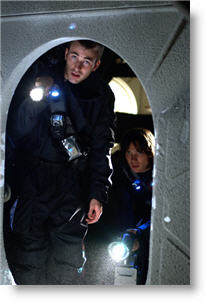

The worldview subtext of this film is Atheistic, Secular Humanistic, and anti-Christianity— sharing the beliefs of director Danny Boyle.
How can we know there’s a God? Answer
What if the cosmos is all that there is? Answer

Suicide, what does the Bible say? Answer
If a Christian commits suicide, will they go to Heaven? Answer
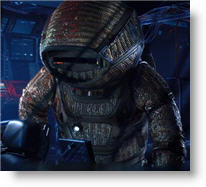


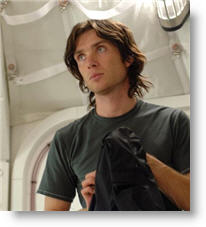

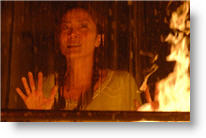

| Featuring |
|---|
| Rose Byrne, Cliff Curtis, Chris Evans, Troy Garity, Cillian Murphy, Hiroyuki Sanada, Mark Strong, Benedict Wong, Michelle Yeoh |
| Director |
|
Danny Boyle |
| Producer |
| Andrew Macdonald, Allon Reich |
| Distributor |
 Fox Searchlight Pictures, a sister company of 20th Century Fox, a division of The Walt Disney Company |
“Dark days are coming.”
The year is 2057. Our sun is dying, and our planet faces certain destruction. In an attempt to prevent this from happening, the scientists of the day have devised an ingenious solution. A spaceship must be piloted to the sun where upon a “stellar” bomb (also referred to as “the payload”) must be dispatched, creating a “sun within a sun,” in order to reignite it. There has already been one failed attempt to do so by the crew of the spaceship Icarus I, who disappeared along with the ship in unexplained circumstances. Seven years later, the hopes of the planet now rest on the crew of Icarus II, comprised of Captain Kaneda (Hiroyuki Sanada), physicist Capa (Cillian Murphy), biologist Corazon (Michelle Yeoh), pilot Cassie (Rose Byrne); medic Searle (Cliff Curtis); comms officer Harvey (Troy Garity) and engineer Mace (Chris Evans).
While the mission starts well, as the crew travel for two years relatively unscathed to their iridescent destination, things start to go awry after they receive a belated signal from Icarus I. Faced with the first of many dilemmas, the crew call a meeting to decide whether or not it would be worth the risk to send a small party to pilot the craft, which also contains a “stellar” bomb, thus doubling their fire power and with it the success of the mission.
Fate intervenes to decide the matter when a fire in the ship’s bio-garden reduces the crew’s oxygen supply to a level that won’t allow the crew to complete their mission. Forced to board the earlier vessel in search of oxygen supplies, the small party of Capa, Searle, Harvey and Mace are troubled to encounter a desolate, uninhabitable ship full of the dust of their decomposed predecessors. Technical complications between Icarus I and II leave the group isolated on the craft which now contains only one spacesuit, and thus only one means of escape for one group member.
This is the first of a number of moral dilemmas that the crew are faced with as events begin to spiral out of control. Disaster follows disaster on the ship, and as the likelihood of them completing their mission becomes more and more remote, the crew start to suspect foul play. Events take an even more sinister turn as their saboteur is slowly revealed, putting the mission in turmoil.
As with previous Danny Boyle movies, e.g. “Shallow Grave,” “Trainspotting,” “28 Days Later,” et al, there is bad language in the script—mainly the f-word—and the Lord’s name is taken in vain a number of times. This is not, however, quite as excessive as it was in the aforementioned films and may be in keeping with the realism of the stressful situations in which their usage occurs.
There is also a great deal of violence, some of which is quite graphic and disturbing. For instance, there is one scene where we see in graphic detail the aftermath of a crew member’s apparent suicide. Indeed, the very fact that this theme is picked up on in the movie may well be of some concern to pro-life Christians, especially since there is a suggestion that this was done for the good of the crew in order to conserve O2. From a Biblical perspective, suicide can never be condoned, whatever the reason may be.
The issue of self-sacrifice is ultimately the overriding theme of the movie. This is something to be applauded, as this theme is picked up several times throughout. Whenever the crew are faced with a moral dilemma, there is always someone with the moral strength of character to step up and do the right thing, both for the crew and for the planet they are trying to save. Deeper spiritual issues are also touched upon throughout the course of the film, such as mortality, the corruption of the spirit and, most profoundly, the last judgment. The question of whether or not it is right for man to mess with the laws of nature and what God has decreed is also addressed, although not to this viewer’s satisfaction. Overall, the message of the film is a positive one which should ring true with a Christian audience.
I had high hopes for this film, there was a real buzz about this film prior to its release, and the trailer was intriguing. While the film is not without merit—the interior set design of the spaceship is visually arresting and the CGI rendering of space and the sun is literally stunning—I found the film to be somewhat less than the sum of its parts.
Clearly ambitious in scope, and interesting for much of its running time, the film fails to answer some of the big questions that it raises and seems to get away from itself near the end. It also requires an unusually large suspension of disbelief from the viewer—if one is to accept its central premise and subsequent plot developments. I also found the experience somewhat derivative; the film certainly owes a debt to Tarkovsky’s “Solaris” (1972) and Kubrick’s “2001: A Space Odyssey” (1968), both masterpieces of their time. But the film was also reminiscent of more recent schlock like “Event Horizon,” begging the question of why did the director not try harder to make a more interesting and relevant contribution to a recently uninventive and uninspiring genre?
- Violence: Very Heavy (some bloody and gory)
- Profane language: Heavy— • J*sus Chr*st (3) • J*sus (5) • G*d (8) • h*ll (3) • d*mn
- Vulgar/Crude language: Very Heavy— • f-words (17), including “F**k you” • s-words (9) • screwed • son of a b*tch
- Nudity: None
- Sex: None
See list of Relevant Issues—questions-and-answers.


Moral rating: Very Offensive / Moviemaking quality: 2½
Moral rating: Offensive / Moviemaking quality: 4½
My Ratings: Moral rating: Average / Moviemaking quality: 4